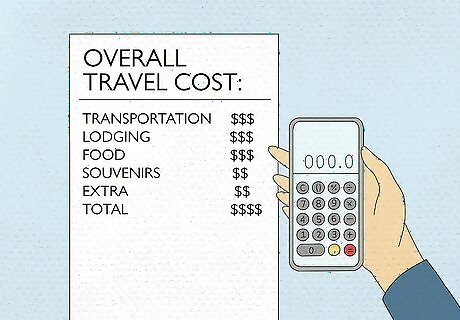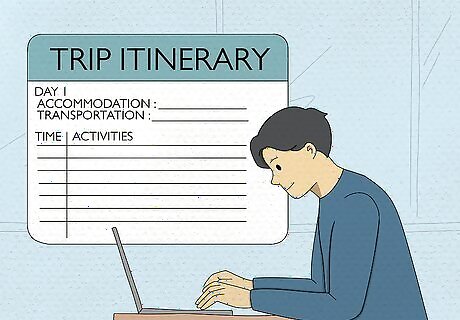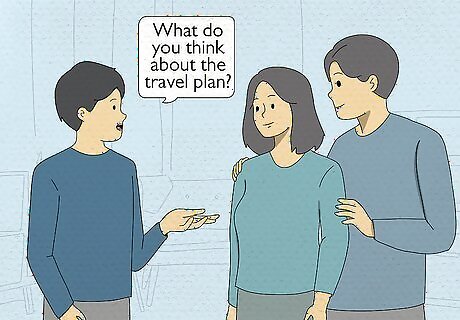
views
Making a Plan

Pinpoint where you want to go. Before talking to your parents, you and your friends should get together and all figure out the details of the trip. The most important part of your trip to figure out is where you are going to go. Even if you already know your destination, make sure you know exactly what region or area you want to visit. If you plan to visit multiple locations, make sure you know exactly where they are and how far apart they are from each other. For instance, even if you know that you want to visit California, you can narrow down your trip to visiting San Francisco and San Jose. If you and your friends disagree on where to go, try to reach a consensus. If your parents pick up on the fact that you and your friends have different thoughts about the trip, they will be less likely to give their permission.

Figure out how long your trip will be. Once you know where you're going, figure out how long your trip will take, including travel time. Make sure that you and your friends check a calendar and pick the exact dates you will be leaving and coming back. Check in with your friends about their schedules and coordinate a time that works best for everyone.

Make a day by day plan. Make a comprehensive day-by-day plan that details exactly where you will be throughout your trip. This is especially important if you are visiting multiple cities or countries. You need to know exactly what days you will be in each location. You also should figure out what main activity or activities you will be doing each day. For example, one day in your schedule could be: “Monday, September 12: 3rd day in Mexico City. Visit the Anthropology Museum and the Casa Azul. Eat dinner downtown.” Hear your friends out and compromise when you are planning your activities.

Figure out transportation. Once you know exactly where you'll be on each day of your trip, you can start to figure out how you will get from place to place. If you are travelling a long distance, you will have to fly to your destination. Then figure out how to get from place to place based on the plans that you laid out. Note the cost of the transportation. Don't actually buy any tickets, just write down how much a ticket would cost.

Find places to stay. Figure out how where you will stay overnight for each part of the trip. Ask you friends if they know of anyone in the place you are visiting where you could stay. Also check out the prices of hotels and hostels, and write down several options. Aim to be economical, but don't stay somewhere that isn't reputable just because it's cheap.

Estimate the overall cost. Add up the price of your transportation and lodgings. Then add the approximate amount you expect to spend per day on food and souvenirs. Add a little extra in case something comes up. This should give you a good estimate of the cost of the trip. Adding a little extra money to your budget in case of emergencies will help show your parents that you are responsible and thinking ahead. This may help convince them to let you go.

Write out your itinerary. Either type up or write down your itinerary. It should include everything that you have already worked on, and should be organized by day. Each day should include the main activities of the day along with the price of each hotel and method of transport. This will show your parents how much thought you put into your trip as well as give them an idea of the sorts of things you will be doing. This may help reassure them.
Talking to Your Parents

Introduce your friends to your parents. Make sure that your parents are familiar with your friends before you show them the plan. Invite your friends to your house a couple times so that they can get more familiar with them and see that they are responsible. If they've never met your friends, have your friends over for dinner and introduce them first. After that, have them come over a few times. Your parents can't help but worry about you. They will be more likely to let you travel with someone they know rather than someone they don't know at all.

Find a good time to talk with your parents. Don't spring the trip up out of the blue. Find a good time to sit down and go over your plan with your parents. It may be best to tell your parents that you want to talk about something and ask them when would be convenient for them. It may be best to talk to your parents alone instead of with your friends. Especially if your parents don't know your friends very well, they may feel more comfortable and willing to agree to the plan if they are talking just with you.

Introduce the idea of the trip. When you and your parents have sat down, tell them that you want to go on a trip. Let them see that it is something that you are passionate about and have been wanting to do for a long time. Also tell them which friends are coming on the trip with you.

Tell your parents why this trip is important to you. After you tell your parents that you want to go on the trip, explain why this trip would benefit you. If your parents have qualms about you going on a trip, they want to know that it's worthwhile. Don't mention partying as a reason why you want to go on the trip; instead talk about how it would enrich you as a person. You could say something like, “I really want to go to Spain because I've always been curious about my Spanish heritage, and I also want to actually use the Spanish that I've learned.”

Show you parents the itinerary. Give your parents the physical copy of the itinerary, and run through each day while they are looking at it. Explain your ideas about transportation and lodgings. Also describe the main activities that you are going to be doing on each day of your trip. You want your plan to appear as ordered and thought-out as you can, so present it chronologically instead of skipping around. Make sure that you mention why each activity you are doing is enriching or beneficial.

Run over the budget. Tell your parents what budget you arrived at. Let them know that it is only an approximate budget, and that it can be worked down. Break down the budget into parts, showing them how much money is going towards transportation, hotels, etc. If your parents are financially-conscious, you could even add that you are willing to work or do chores in order to earn money for your trip.

Ask your parents what they think. It's important to have a back and forth conversation with your parents. After you have gone through the entire plan, ask them what they think. Listen carefully to any questions or concerns that they have. By this time, your parents should see that you have planned thoroughly and thoughtfully, and should be on board. This will show your parents that you still value their opinion. This is a sign of maturity. As a result, they may be more likely to agree to your trip. If your parents are not on board with your idea, be prepared to make a few compromises in order to arrive at an agreement.
Compromising

Suggest ways you can save money. The budget may be what is giving your parents pause. If they are worried that the trip will cost too much money, suggest a few ways that you can save money. This includes splitting hotel room costs between your friends, using inexpensive methods of transportation, or shortening your trip. If you have enough money saved up, you offer to pay for a portion of the trip, which will help save your parents money. If you have a lot of money saved up, offer to pay for the whole trip. You can also suggest postponing the date of the trip so that you can save up money in the meantime.

Show your parents that you will be safe. Safety might be another concern for your parents. Let them know all the ways in which you will be staying safe. This could include getting vaccines, picking hotels instead of hostels, using various methods to keep your passport, money and phone secure, and sticking together with your friends instead of splitting off. Letting your parents know where you will be at all times may help reassure them and set their minds at ease.

Talk about communication. Your parents will want a way to communicate with you. Let your parents know that you will always be by your phone when you travel. If your parents want to check in with you every day, suggest a time of day when they can call and see how you're doing. If you are travelling internationally, see if you can use your phone in the country you're visiting or if you can rent a phone. Tell your parents that you will call or text them every morning (to share your plans for the day) and every night (to let them know that you are safely back to the hotel or hostel).

Adjust your friend group. Your parents may like the fact that you would be traveling alone, but want someone a little older to travel with you. Consider asking an older friend or sibling if they want to join you on the trip. It could give your parents peace of mind if they knew that there was someone older going with you, especially if that person has done travelling before. Make sure that this older friend or sibling is mature. Just because someone is physically older than you does not always mean that they are more mature and responsible.

Changing their mind about the destination. Your parents could simply feel that the place you are traveling to is not safe or suitable. This can be a hard objection to work around. First, give your parents more information about the city or country that you want to visit. Try to see if any of your friends or acquaintances have travelled there, and tell your parents about their experiences. Videos of the city or country work well, because they can give your parents some idea of what the place is actually like. If you absolutely cannot get them to embrace the place you want to visit, you may have to think about changing your plans to another destination.

Talk over the plan with your friends and your parents. Get your friends and your parents together to talk about any changes that you may have made to your travel plans. It will make your parents feel better to know that everyone is on the same page, and that you and your friends are taking the trip seriously. For example, you can all have dinner at a pizza restaurant, and talk over your plans there. Try to choose a relaxed environment to minimize stress and miscommunication.




















Comments
0 comment